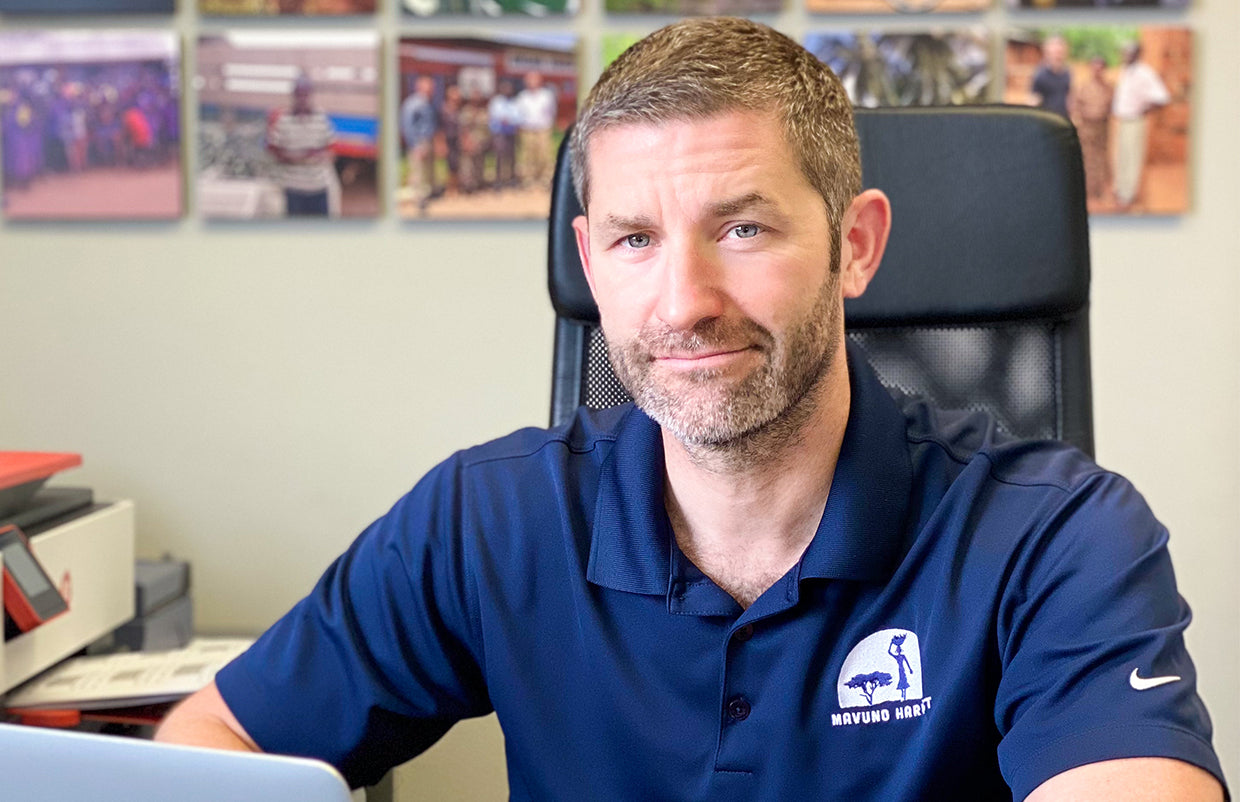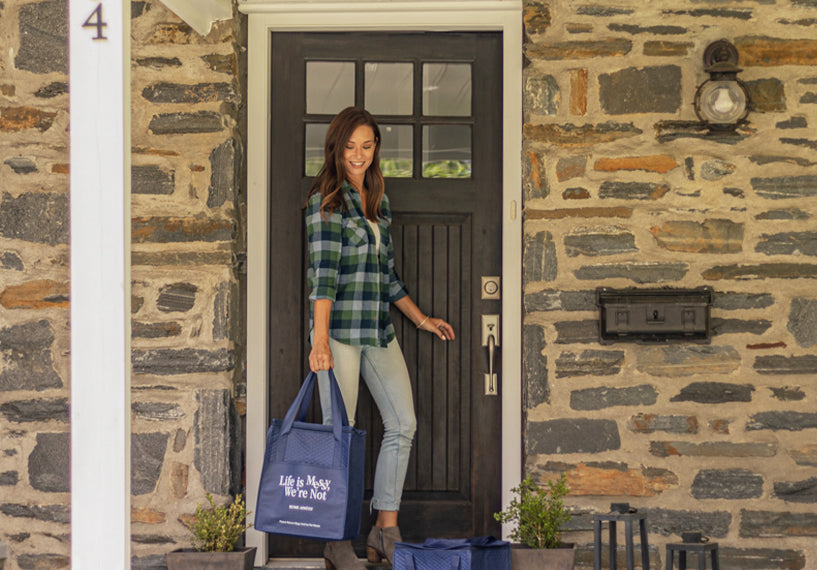H.A. Hang: Phil Hughes

The coolest part of our business has always been our clients. We’re amazed by all they do: CEOs and business owners, world travelers, authors, inventors, healers, entrepreneurs, newscasters, artists, pro athletes, musicians, caretakers, and philanthropists.
We launched this series to share the stories of our clients and form connections within the H.A. community. Enjoy!
______________________________________
Home Appétit: Your company sells dried fruit from Africa. But I can tell you're not in Africa right now.
Phil Hughes: Right. I’m in our warehouse in North Philly. I grew up in East Falls and now live with my family two houses down from where I grew up. I graduated from La Salle High School, then went to Catholic University in DC.
What did you study?
Mechanical engineering. I had an internship during college in downtown D.C. and my commute would take me past the headquarters of the Peace Corps every day. It stuck with me.
So you joined?
I always had wanderlust, but not right away. I graduated in 2001, came home, and got a job as an engineer designing HVAC systems for big buildings.
That does not jibe with wanderlust.
No. I was 22 years old, wearing a suit and taking the train to the office every day. My heart wasn't into it. I was depressed by the whole office situation. The Peace Corps popped into my head. I joined in 2003.
How did your family and friends react? You had a great degree and a solid job.
Everyone knew I wasn’t really into being an engineer. I did it because I was good at math. My parents were proud of me because I was going to help people. Admittedly, at that time, I was looking for an adventure and altruism was a secondary benefit. But, I later realized the value of doing something that helps other people.
I know you landed in Africa. Was that your choice?
Not really. Now you can request where you want to go and what you want to do, but in 2003, the Peace Corps was organized differently. I remember getting a letter in the mail saying I was going to Kenya to be a public health volunteer. I knew nothing about Kenya. At that point in my life I had only been out of America twice. It was intimidating, but I wanted an adventure.

Where did you start?
HIV was a big problem in sub-Saharan Africa at that time. The mission was to educate people about it. Africa is, for the most part, a conservative culture. We talk about things like that all the time in the States. I mean, we had songs like “Let’s Talk About Sex.” They didn’t talk about AIDS and safe sex there, how the disease was transmitted, how dangerous it could be.
Did you get training?
Yes. The first part is to learn the culture. I did three months of training with other Americans, lived with a family, and took Swahili language classes. I got pretty good! But it’s been 20 years so I’m terrible now.
Then what?
I was assigned to a village called Miti Mingi. There's no specific plan, you have to create that on your own. It was a two year assignment and Peace Corps told us it would take a long time to make inroads. You have to meet people, develop relationships and earn their trust. I mean, I had a wooden penis to demonstrate how to put on a condom. You gotta ease into that kind of talk.
I’m picturing you like Book of Mormon…
Basically, minus the religion part.
How did it go?
Once I had established myself, I was able to start educating people. Peace Corps teaches you the concept of sustainable development. I eventually had an idea to build a clinic, but I had to do it in a way that would ensure it would last after I left. It was clear I needed community involvement.
That is quite a leap for a kid in his 20s from East Falls.
It’s one of many lessons I’ve taken with me. You can't dictate projects to people, you have to get buy-in. I learned so much from the Peace Corps.
Tell me about the village you were in.
It was very spread out and there were probably a few thousand people. I had a bike which I rode everywhere. There was no electricity or running water. I used a lantern to read at night and a car battery to charge my phone. I see Peace Corps volunteers now who have blogs and iPhones!
How did you know that you were succeeding?
The Peace Corps laid out three goals. The mission, cultural sharing, and just doing something. I found that Africans had a crazy idea of what America was. They would take car batteries and plug them into TVs and see wrestling or Britney Spears. I was like, “That is not what America is.” So, on the most basic level, I did share our culture and I learned about theirs—who they are and what their country is. I’m supposed to carry that goal with me my entire life, which I clearly do. I don’t have any statistics on how many people I educated about HIV and AIDS. Did I save lives? I don’t know. But I built a clinic. We set up VCT—voluntary counseling and testing, so people would at least know if they were HIV positive or not. That’s the biggest way of stopping the spreading of the disease. I had stacks of condoms that I gave out and talked to many people. We partnered with other governments and foundations and the CDC.We had paid counselors and staff training.
That all sounds like a massive success! What happened when you came back home?
Despite the previous two years, I didn’t pursue public health. I got my MBA at Temple, did some consulting that took me to Rwanda, and got a job at Tastykake, which I was laid off from. But I had the idea for Mavuno when I was in Africa and kept it with me. It was pretty easy to see there is a problem in these villages. There is no money, zero opportunity, zero jobs. Everybody farms but there is no farming industry. It just stuck with me: how can I help fix that?
When did it all come together for you?
After I got laid off, I was trying to figure out what to do next. I was on a trip with my dad to see the Phils at spring training and he was basically like, you gotta do something with your life. I was either thinking about medical school or starting this dried fruit idea. Medical school lasted six weeks. Then I was on a plane back to Kenya to figure out the fruit thing.
Wow! A true leap. What year was that?
2011. I had started a business before then. I’ve been entrepreneurial my whole life. Not necessarily starting a business, but doing things on my own. I was 30 at that point, with no responsibilities. It was the right time.
What did you discover in Africa this time?
You see all these farmers selling fresh fruit on the side of the road in Africa, but really no one to buy it. Mangoes, pineapple, bananas, papayas. So much of it goes to waste. After much trial and error, I wound up connecting with someone who was sourcing fruit from farmers and drying it. I learned about exporting, packaging, FDA rules, formed connections and was ready to sell products by 2012.
Where was your first account?
I pitched to Swarthmore CO-OP. I was so nervous. I had spent all this time and money developing this thing. I met with the buyer and the meeting lasted about 20 seconds—she said yes. I was on the shelf there quickly. CO-OPs were a great market for us, because they are mission based and so are we.
Where is business today?
We are probably in 4,000 stores at this point. We continue to invest in our growth. We moved into this warehouse this year, I hired more sales people, and got a big packaging machine. We’re looking at selling in new places beyond grocery and are doubling down on the stores that move the most product for us. Kimberton Whole Foods and Erewhon in L.A. are top sellers.

Phil in Kenya in 2005
CPG—consumer packaged goods—is a competitive market. Any advice for people starting out there on how to break in?
Shelf space is always competitive. I was able to scratch some out just by being naive and walking into small places. That still works.
How does your original mission for Mavuno align with impact?
We work with small farming co-ops in Africa, create supply chains and provide income and jobs. In 2023 alone, we worked with 57 farmers and helped sustain 175+ factory jobs in Africa. I've been working with the USDA and European and African organizations and companies. They are helping us create more connections and get more farmers involved. We have added chocolate products and nuts. I’m looking to add more African food products to sell. And I visit Africa as much as I can.
Purchase Mavuno Harvest's delicious dried fruits, fruit bites and nuts on their website. Follow Phil's journey on Instagram.


